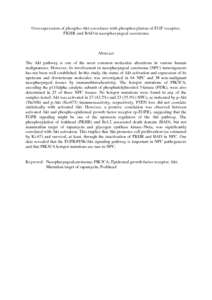Citation
Yip , WK
(2008)
Overexpression of phospho-Akt correlates with phosphorylation of EGF receptor, FKHR and BAD in nasopharyngeal carcinoma.
Oncology reports, 19 (2).
pp. 319-328.
ISSN 1021-335X, ESSN: 1791-2431
Abstract
The Akt pathway is one of the most common molecular alterations in various human malignancies. However, its involvement in nasopharyngeal carcinoma (NPC) tumorigenesis has not been well established. In this study, the status of Akt activation and expression of its upstream and downstream molecules was investigated in 64 NPC and 38 non-malignant nasopharyngeal tissues by immunohistochemistry. The hotspot mutations of PIK3CA, encoding the p110alpha catalytic subunit of phosphatidylinositol 3-kinase (PI3K), were also determined in 25 of these NPC tissues. No hotspot mutations were found in any of the samples tested. Akt was activated in 27 (42.2%) and 23 (35.9%) NPCs, as indicated by p-Akt (Thr308) and p-Akt (Ser473) immunoreactivity, respectively. PTEN loss did not correlate statistically with activated Akt. However, a positive correlation was observed between activated Akt and phospho-epidermal growth factor receptor (p-EGFR), suggesting that the EGFR signaling might be one of the upstream regulators of the Akt pathway. The phosphorylation of forkhead (FKHR) and Bcl-2 associated death domain (BAD), but not mammalian target of rapamycin and glycogen synthase kinase-3beta, was significantly correlated with Akt activation. This implies that Akt promotes cell proliferation (as estimated by Ki-67) and survival, at least, through the inactivation of FKHR and BAD in NPC. Our data revealed that the EGFR/PI3K/Akt signaling pathway is important in NPC pathogenesis and that PIK3CA hotspot mutations are rare in NPC.
Download File
![[img]](http://psasir.upm.edu.my/16015/1.hassmallThumbnailVersion/Overexpression%20of%20phospho-Akt%20correlates%20with%20phosphorylation%20of%20EGF%20receptor%2C%20FKHR%20and%20BAD%20in%20nasopharyngeal%20carcinoma.pdf)  Preview |
|
PDF (Abstract)
Overexpression of phospho-Akt correlates with phosphorylation of EGF receptor, FKHR and BAD in nasopharyngeal carcinoma.pdf
Download (84kB)
| Preview
|
|
Additional Metadata
Actions (login required)
 |
View Item |

